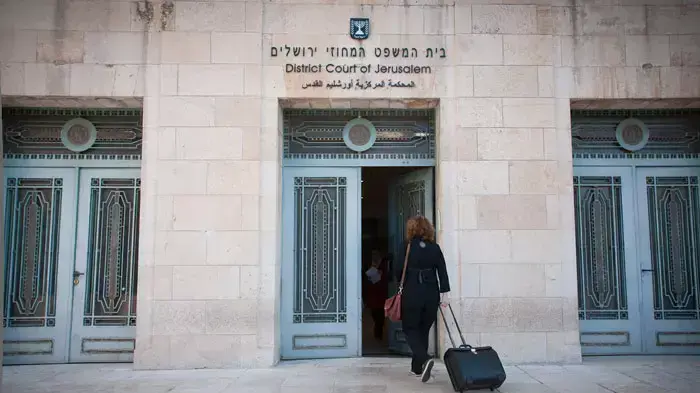news
News in Israel
Criminal news and law
Former Foreign Ministry official wins bribe.
Judge: A shameful and frightening investigation
Joshua Gabay was charged five years ago with dozens of cases of theft by a public official, and even with taking money returned from the embassy in Cairo.
Now, the Jerusalem District Court has decided to dismiss all charges, and Judge Bar-Asher sharply criticized the conduct of the State Attorney's Office and the police: "A distorted and far-reaching interpretation."
Tags
Ministry of Foreign Affairs
Daniel Dolev
Sunday, 14 March 2021, 22:27 Updated: 22:28
Share on Facebook
Share on WhatsApp
Share on general
Share on general
Share on Twitter
Share on Email
0 comments
(Photo: Omar Miron)
Yehoshua "Shuki" Gabay, a former senior Foreign Ministry official accused of bribery and theft of public funds, is completely acquitted of the charges against him.
The verdict was handed down on Thursday, about five and a half years after the indictment was filed, and about seven years since the affair broke out.
The Jerusalem District Court harshly criticized the conduct of the police and the State Attorney's Office in the case.
Gabay was the Deputy Accountant of the Ministry of Foreign Affairs.
In November 2015, a serious indictment was filed against him, which attributed to him, among other things, an attempt to steal $ 74,000 extracted from the Israeli embassy in Cairo, when it was evacuated during an attempt by an Egyptian mob to break into it in 2011.
In addition, the Economic Department of the State Attorney's Office claimed that Gabay had received electrical products for his personal use from the firm's supplier of electrical products, and in return made sure to approve payments for him and approved the scope of the contract with him.
Gabay, who will be represented by Adv. Dror Matityahu, was also charged with dozens of cases of theft by a public employee, because he allegedly took care, contrary to procedures, that the firm would bear the expenses of his family vacations in Eilat. The indictment attributed him to other cases of theft by a public employee. Who allegedly made sure the office paid for meat products he bought.
At a discounted price
Due to the growing demand for effective pain treatment: B-Cure laser in a special operation
To the full article
Along with Gabay, the director of the ministry's economy department, Avshalom Assyri, was also charged.
His trial was conducted separately, and in 2019 he was convicted of all charges against him - bribery, receiving anything fraudulently, and many cases of theft by a public servant.
He was sentenced to 32 months in prison.
But Gabay's fate was different.
In the verdict, Judge Tamar Bar-Asher of the Jerusalem District Court noted that the investigation against Assyri and Gabay was opened for complaints by an employee who was subordinate to Gabay, and for a long time collected evidence and documents.
"The significant involvement of the employee in the investigation has significance and yet there are consequences for two main reasons," Bar Asher wrote.
"One, due to the police's choice to ignore the defendant's words and his power came, because between the two there is an ongoing dispute that allegedly motivated her to file a complaint against the defendant, which he claimed was an idle complaint. The other stems from the problematic impression she left."
The judge further wrote that the situation that arose was that in fact, the same employee "was the factor that actually carried out the substantive investigative actions ... not only were her motives not examined, but it was evident that an attempt was made to silence the person who raised this issue or ignore his remarks."
The verdict sharply criticizes the police investigation.
The judge noted that Gabay was humiliated at the Foreign Ministry, and that during his interrogation, the interrogators threw "hard things at him, using his daughters, and much shame that would be caused to them by the newspaper headlines that would be published ... and that by the time he was released his little daughter would be an adult."
Investigators even used the death of Gabay's wife years earlier to mourn him.
In the 211-page verdict, Judge Bar-Asher reviewed the charges one by one, acquitting Gabay of them.
Thus, for example, with regard to vacationers who were allegedly approved in violation of procedures - she found that there were no procedures at all.
"The facts that emerged from the accuser's evidence regarding the vacations of Foreign Ministry employees are astounding," she wrote.
"This is a benefit of millions of shekels a year, which according to the testimonies was given for about twenty years from the state coffers to Foreign Ministry employees without rules and without any supervision."
The prosecution even claimed, in accordance with the claims of the same employee, that Gabay had a "method" for handling the payment demands, which he used when he committed the offenses attributed to him.
According to the claim, as part of the method, he took all the necessary steps to approve the payment requirements in the ministry's computerized system, illegally using the passwords of other employees, sometimes when they were absent from the ministry.
The judge did not accept the claim.
She found that the prosecution had not proved that this was a method that Gabay used only in cases where offenses were attributed to him.
More importantly, it found that the entire claim relied on circumstantial evidence, for which Gabay provided other explanations.
"The defendant gave a plausible explanation to the entire body of circumstantial evidence," the verdict read, "thereby even refuting the incriminating assumption."
As part of the indictment, which concerned funds returned to Israel from the Israeli ambassador to Cairo, it was described that the same funds were kept in a safe in Gabay's office.
The prosecution relied on the testimony of an employee who believed that the money should have been deposited with the Bank of Israel, even though there was no procedure in the ministry that would determine what to do with the money.
"Given the role of that employee," the judge wrote, "and the fact that he is not at all in the management of the funds and the relevant system, it is not at all clear on what basis or by virtue of what the accuser (the prosecution) chose him, arbitrarily, as the factor to determine "It is not at all clear or even explained by the accuser why the words of a certain employee, whom he did not support beyond his own words, are the standard for dealing with the said money, which no one knew how to deal with."
The judge ultimately ruled that the prosecution failed to prove any of the elements of the offense.
"This charge is, as stated, strange and puzzling," she wrote.
"The defendant's accusation of this charge is not at all clear and it seems that only a distorted and far-reaching interpretation given to the conduct of the Cairo embassy's emergency fund could have seen the defendant's conduct as conduct that raises suspicion of attempted theft."
In connection with the bribery offense, the judge found that the prosecution had failed to prove that Gabay had received electrical goods without paying for them.
His version was that he transferred the money to the other defendant, Assyria, so that he would pay the appliance supplier, and that only upon his arrest did he learn that Assyria did not transfer the money.
Gabay further requested during his interrogation by the police that the investigators check his bank accounts, but the police did not do so.
At trial, it became clear that he had indeed withdrawn cash in an amount close to that written on an invoice issued by the appliance supplier.
Moreover, the judge found that even if it had been proven that he had received the electrical products free of charge, this could not have been related to Gabay's role, since he could not have done better with the same supplier.
The prosecution sought to reject Gabay's version of the matter, claiming that it was an "occupied version" - one that did not appear in his police interrogation or in his written response to the indictment, and in fact was only heard on the witness stand for the first time.
However, the judge did not agree to accept the claim, and ruled that the later version could be accepted, in light of the treatment Gabay received in his interrogation.
"In view of the shameful conduct of the interrogation of the defendant, already in its early stages ... one should not be surprised at his choice not to answer the questions of his interrogators," the judge wrote.
"The defendant's choice to remain silent during his interrogation was also a sensible conduct, in light of his attempts to humiliate him in degrading ways worthy of condemnation and criticism. All of these are joined by the defendant There is a desire on the part of the interrogator to hear his version and to examine the audio in his words ... Reading the defendant's interrogation will leave a difficult and disturbing feeling, perhaps even frightening, in light of the manner in which the interrogation was conducted. "
Share on Facebook
Share on WhatsApp
Share on general
Share on general
Share on Twitter
Share on Email
0 comments


/cloudfront-eu-central-1.images.arcpublishing.com/prisa/72V5ILYZORGNLHVFBL5EFHNU6Q)


